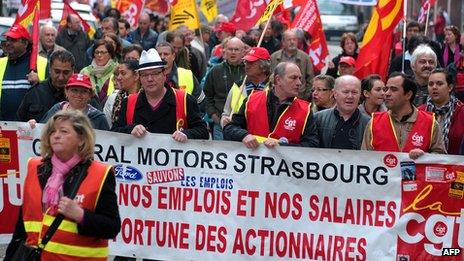Will Europe cut its interest rate?
- Published
- comments

Strasbourg: Europe's May Day marches are especially bitter this year
On Thursday the governing council of the European Central Bank will meet in Bratislava. The speculation is that the ECB will cut its current interest rate of 0.75% by half a percentage point.
There is a new mood in Europe. It is more fear than panic. The medicine is not only judged to be failing, but there are plenty of voices out there claiming it is killing the patient.
Despite a cacophony of claims that the eurozone crisis is over, and numerous sightings of green shoots, many of the economies in southern Europe are not recovering. Unemployment in the eurozone is at 12.1% and the zone's economy will shrink by 0.5% this year.
Unemployment is of greater concern in the corridors of Brussels than debt. It seems that almost every speech is now peppered with a reference to growth and jobs.
The ECB is under pressure to make a cut, less because there is evidence that it will make a difference but more because there is a groundswell that something must be done.
As I have written before, we are in the midst of a retreat from austerity. It is being discarded like unwanted clothing. The new Italian Prime Minister, Enrico Letta, could not have been clearer. "I'll speak to you in the subversive language of truth," he said, "fiscal rigour alone will kill us". It is what France's President Hollande believes. However much the French Socialists have tried to water down the language in their leaked document , externalthey believe Angela Merkel is an "austerity Chancellor'' guilty of "selfish intransigence".
A very senior European official told me in December that the Union had two years to find growth, otherwise all bets are off. At the moment growth remains over the horizon. If the price of keeping the euro together is years of deflation, then sooner or later one country or another will be unwilling to pay it. In the end Europe will be judged not by its ideals but whether it can deliver a modern innovative economy with jobs.
Elastic targets
In the search for a solution targets for reducing deficits have become negotiable. The European Commission has not announced a U-turn, or that it got the policy wrong, it is just regularly easing targets for countries like Spain, Greece, Ireland, Portugal and France. It does, of course, raise the question: what was the point of the Stability and Growth Pact, external? It is clear that, in current times, the targets for cutting deficits are open for negotiation.
The Germans still maintain that cutting deficits and implementing structural reforms opens the road to growth later. German ministers are adamantly opposed to borrowing to boost growth. They are anxious that France might openly challenge their policy of reducing deficits and so make more obvious the big divide with Germany which already exists.
An example of how much is changing: remember candidate Hollande declaring that the world of finance was his adversary. This week the embattled French president declared that "our first duty is to stimulate the spirit of business and initiative in our country. It is business that creates wealth, activity and jobs." The socialist president has discovered he needs the business community.
All of this testifies to the fact that a note of desperation is creeping into European discussions. Sooner or later, as the official told me, they must deliver or all bets are off.
That is why the markets expect a rate cut tomorrow. Above all what they want is for low rates to be passed on to small and medium-sized businesses, particularly in southern Europe.